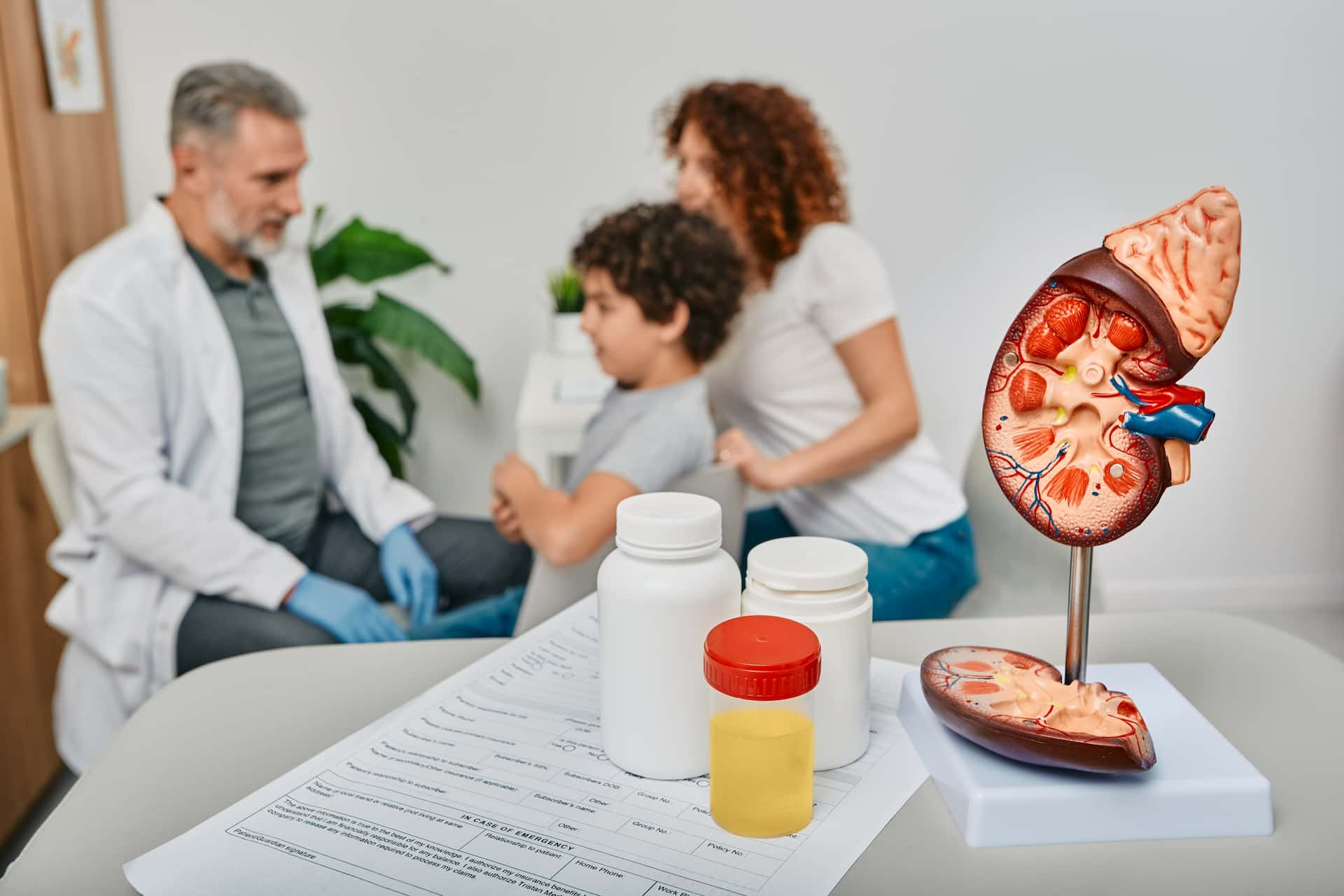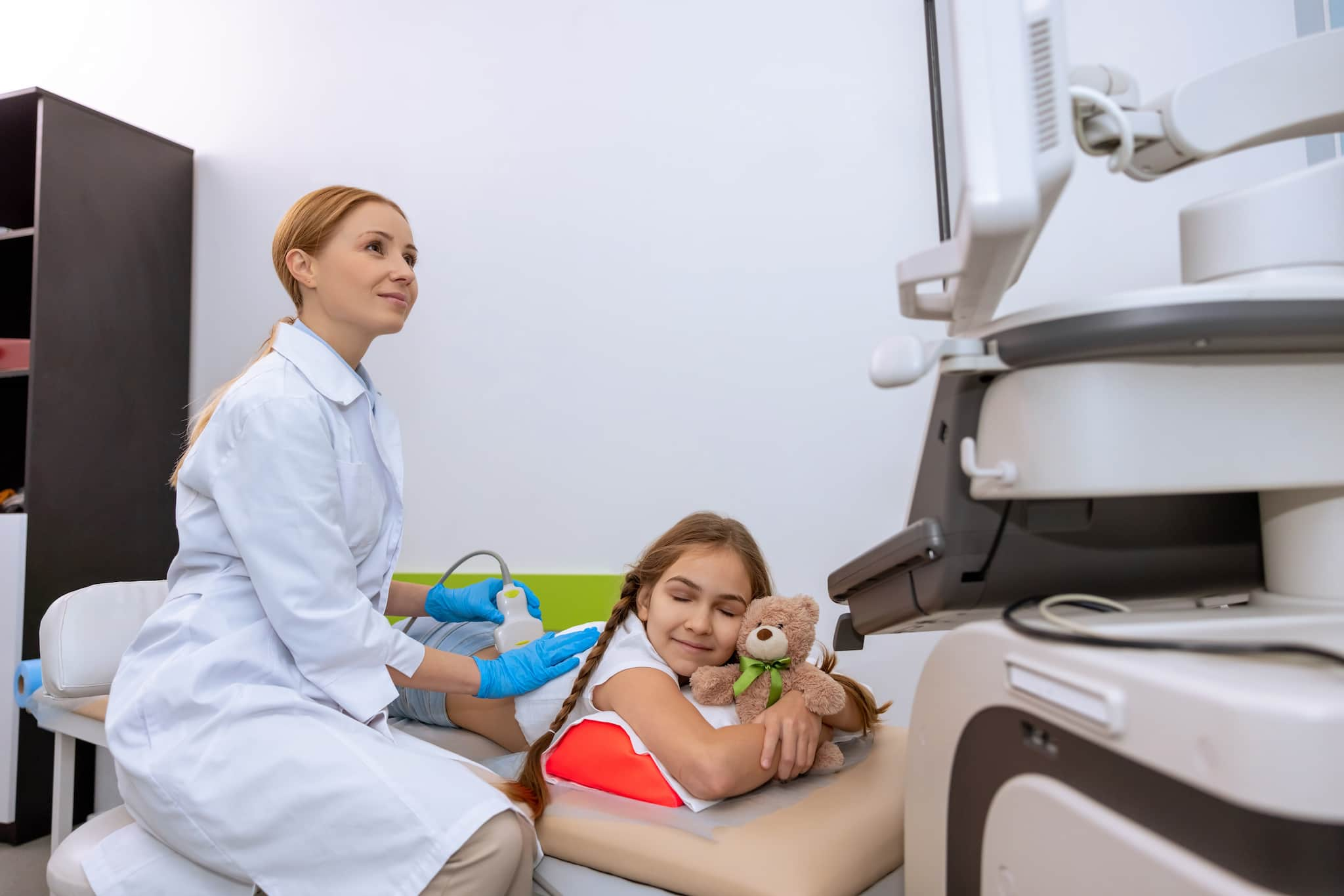Pediatric Nephrology Treatment in Turkey
Healthy Türkiye helps you find the best pediatric nephrology treatment in Turkey at affordable prices and adopts a 360-degree service approach in all areas of health through affiliated hospitals.
- Homepage
- Medical Treatment
- Pediatric Nephrology Treatment in Turkey

About Pediatric Nephrology Treatment in Turkey
Pediatric nephrology treatment in Turkey is for children and adolescents with chronic and acute kidney illness, including dialysis and kidney transplantation. Learn more about this clinical field and how to train in this sub-specialty, as well as access the required syllabus.
Pediatric nephrologists in Turkey diagnose, treat, and manage a wide range of kidney and urinary tract illnesses, including kidney failure, high blood pressure, hereditary kidney diseases, kidney stones, urinary tract infections, and blood and protein abnormalities in the urine. They also understand how to diagnose and treat growth and development issues that are specific to chronic renal disease. They are also excellent at assisting patients in transitioning from pediatric nephrologists to adult nephrologists and urologists. In general, pediatric nephrologists provide the following services:
- Dialysis
- Kidney transplantation
- Kidney biopsies
- The interpretation of x-ray studies of the kidney
- The interpretation of laboratory studies related to kidney disease
- Ambulatory blood pressure monitoring
Children are not merely miniature adults. Their bodies are developing and they have certain medical requirements. Kids typically communicate their concerns in ways that adults do not. They are not always able to answer medical questions and are not always patient and cooperative. Pediatric nephrologists understand how to evaluate and treat youngsters in ways that encourage relaxation and cooperation. Furthermore, pediatric nephrologists use medical equipment made specifically for children. Most pediatric nephrologists’ offices are designed and decorated specifically for children.
A pediatric nephrologist has the specific expertise and knowledge to treat your child if he or she has kidney or urinary tract disease, bladder difficulties, kidney stones, or high blood pressure. Pediatric nephrologists care for children from infancy to late adolescence, and in some cases, into early adulthood.

Pediatric Nephrology Treatment Procedure in Turkey
Pediatric nephrology treatment in Turkey is concerned with the health needs of newborns, adolescents, and children who have kidney problems or infections. Pediatric nephrologists diagnose and treat kidney issues in children, such as kidney failure and kidney stones. They also aid in the management of conditions associated with renal disorders such as high blood pressure and diabetes.
A pediatric nephrologist will usually assess a child’s kidney function and medical history. Diabetes, childhood nephritic syndrome, kidney failure, hemolytic uremic syndrome, hereditary kidney disease, and kidney stones are just a few of the acute and chronic illnesses and conditions that can harm a child’s kidneys. Orders and analyzes laboratory and imaging tests, as well as prescribing medications depending on the results of kidney disease screenings such as urine testing, blood tests, and biopsies. Determines whether a youngster with a kidney condition need dialysis or a kidney transplant.
Pediatric Nephrology Services provides cutting-edge therapies for children with nephrology diseases. While hospitals can be frightening for children, services are delivered in cutting-edge facilities designed for patient and family comfort, alleviating some of the stress associated with treatment. To provide complete care for children with urologic disorders, Pediatric Nephrology Services collaborates with Cedars-Sinai Pediatric Urology Services. Pediatric Nephrology Services also works together with community groups to ensure that patients have access to the necessary developmental, nutritional, educational, and other resources.
Pediatric nephrology treatment in Turkey orders or perform a variety of treatments and therapies to treat kidney problems in children. Pediatric nephrologists are trained in both medical and minor surgical procedures, such as the implantation of a stent in the renal artery. Juvenile nephrologists do not do major operations such as kidney transplants, but they are familiar with all aspects of the patient’s care prior to and during the treatment. Depending on your case, your nephrologist may refer you to a general surgeon, transplant surgeon, or other surgical expert, such as a urologist.

We Care About Your Health
Healthy Türkiye provides the best for your health and comfort. You will feel privileged with us.
7/24 Quality Personal Assistance Throughout Your Journey
Customizable for You All-Inclusive Packages
Get the Right Advice for your Health
Types of Pediatric Nephrology Treatment in Turkey
Pediatric nephrology treatment in Turkey is also focused on dialysis access procedures are operations performed in a blood vessel to enable easy access to your circulation in preparation for dialysis treatments. When the kidneys can no longer filter poisons and fluids from the blood, dialysis is utilized to filter them out artificially. Therapy and care following a kidney transplant to ensure that the given kidneys function effectively and to address side effects and complications caused by the surgery. Renal angioplasty is the placement of a stent to increase blood flow to the kidneys by expanding a renal artery.
Fetal surgery: There is a fertility preservation program for children. The initiative provides an additional alternative for children who have cancer or other medical conditions that may jeopardize their future fertility. It is the only one of its sort in the area. These options are available to both post-pubertal and pre-pubertal children.
Proton beam therapy: Because their organs are still growing, children with cancer benefit the most from proton beam therapy and, conversely, suffer the most long-term harm from standard radiation therapy. Proton beam treatment is an enticing option for children with some types of cancer.
Pediatric nephrologists play an important role in the diagnosis and prevention of recurrent nephrolithiasis. According to the results, clinical experience in pediatrics appears to influence therapeutic choices for children and adolescents with end-stage renal disease. Treatment options and care practices may vary when children are referred to adult subspecialists.
Kidney Disease in Children
Kidney disease occurs when the kidneys are damaged and cannot filter the blood as effectively as they should. Wastes and fluids might accumulate in the body as a result of this injury. Several health issues can arise as a result of kidney dysfunction.
Acute kidney injury (AKI) is a temporary decrease in kidney function that occurs suddenly. Although AKI does not continue long, it can have long-term consequences even when the underlying disease is cured. AKI can be fatal if it is not addressed.
Chronic kidney disease (CKD) progresses slowly over time, usually months to years. CKD can progress to renal failure. Kidney failure indicates that a person will most likely require a kidney transplant or dialysis soon in order to live a healthier life. End-stage kidney disease, or ESKD, is renal failure treated with a kidney transplant or dialysis.
Symptoms of Kidney Disease in Children
The kidneys serve an important role in the body because they act as the body’s filtering mechanism, helping to control water levels and eliminate wastes through urine (pee). They also aid in the regulation of blood pressure, red blood cell formation, and calcium and mineral levels. Yet, sometimes the kidneys do not grow properly and, as a result, do not work effectively. These issues are frequently inherited and not the result of anything a parent did or did not do.
Children with renal disease in the early stages may have little or no symptoms. As kidney disease progresses, symptoms such as, swelling in the feet, legs, hands, or face, called edema. Increased or decreased urine output. Some children may have to urinate more often and may wet the bed at night. Foamy urine due to too much protein in the urine, called proteinuria. Other symptoms may include: Decreased appetite, feeling tired, fever, high blood pressure, itchy skin, nausea or vomiting.
Depending on the source of the kidney illness, symptoms may differ from child to child. Several of these issues can be identified before to the birth of a child through regular prenatal testing and treated with medication or surgery while the child is still small. Additional issues, including as urinary tract infections (UTIs), development issues, or excessive blood pressure, may emerge later (hypertension).
Diagnosis of Kidney Disease in Children
Ultrasound is used to detect kidney abnormalities before birth. Children are sometimes diagnosed with other disorders where kidney difficulties are more likely. Several health problems about a child’s health usually lead to a diagnosis of CKD. A child’s physician may order the following tests based on his or her health conditions or symptoms:
Urinalysis: Protein levels in a child’s urine will be determined. Protein in the urine could indicate renal impairment.
Blood tests: Blood tests can reveal a variety of information, including kidney function, blood chemical levels, and red blood cell levels, all of which the kidneys help to regulate. There are sometimes specialist blood tests that can assist diagnose certain kidney illnesses like lupus.
Ultrasound and X-rays: Images of the kidneys aid in identifying any damage to the kidney and its surrounding structures. They may also provide information as to what triggered the renal disease.
Kidney biopsy: A small piece of kidney tissue is removed and studied under a microscope to evaluate the origin and amount of kidney injury.
Kidney disease in children is defined as irreversible kidney damage that cannot be reversed. However, there have been significant advancements in the care of children with CKD that can reduce the progression of the disease and avoid the development of additional dangerous disorders.

2026 Cost of Pediatric Nephrology Treatment in Turkey
All types of medical attention like pediatric nephrology treatment are very affordable in Turkey. Many factors are also included in determining the cost of pediatric nephrology treatment in Turkey. Your process with Healthy Türkiye will last from the time you decide to have a pediatric nephrology treatment in Turkey until the time you are fully recovered, even if you are back home. The exact cost of a pediatric nephrology treatment procedure in Turkey depends on the type of operation involved.
The cost of pediatric nephrology treatment in Turkey does not demonstrate many variations in 2026. Compared to costs in developed countries like the United States or the UK, pediatric nephrology treatment costs in Turkey are relatively low. So, it’s no wonder patients from across the world visit Turkey for pediatric nephrology treatment procedures. However, price is not the only factor affecting choices. We suggest looking for hospitals that are safe and have pediatric nephrology treatment reviews on Google. When people decide to seek medical help for pediatric nephrology treatment, they will not only have had low-cost procedures in Turkey, but also the safest and best treatment.
At clinics or hospitals contracted with Healthy Türkiye, patients will receive the best pediatric nephrology treatment from specialist doctors in Turkey at affordable rates. Healthy Türkiye teams provide medical attention, pediatric nephrology treatment procedures and high-quality to patients at a minimum cost. When you contact Healthy Türkiye assistants, you can get free information about the cost of pediatric nephrology treatment in Turkey and what this cost covers.
Why Is Pediatric Nephrology Treatment Cheaper in Turkey?
One of the main considerations before traveling abroad for pediatric nephrology treatment is the cost-effectiveness of the whole process. Many patients think that when they add flight tickets and hotel expenses to their pediatric nephrology treatment costs, it will become very expensive to travel, which is not true. Contrary to popular belief, round-trip flight tickets to Turkey for pediatric nephrology treatment can be booked very affordably. In this case, assuming you are staying in Turkey for your pediatric nephrology treatment, your total travel expense of flight tickets and accommodation will only cost less than any other developed country, which is nothing compared to the amount that you are saving.
The question “Why is pediatric nephrology treatment cheaper in Turkey?” is so common among patients or people simply curious about getting their medical procedure in Turkey. When it comes to pediatric nephrology treatment prices in Turkey, there are 3 factors allowing for cheaper prices:
The currency exchange is favorable for anyone looking for pediatric nephrology treatment who has a euro, dollar, or pound
The lower cost of living and cheaper overall medical expenses such as pediatric nephrology treatment
For pediatric nephrology treatment, incentives are given by the Turkish Government to medical clinics working with international clients
All these factors allow for cheaper pediatric nephrology treatment prices, but let’s be clear, these prices are cheaper for people with strong currencies (as we said, the euro, dollar, Canadian dollar, pound, etc).
Every year, thousands of patients from all over the world come to Turkey to get pediatric nephrology treatment. The success of the healthcare system has increased in recent years, especially for pediatric nephrology treatment. It’s easy to find well-educated and English-speaking medical professionals in Turkey for all kinds of medical attention such as pediatric nephrology treatment.

Why Choose Turkey for Pediatric Nephrology Treatment?
Turkey is a common choice among international patients seeking advanced pediatric nephrology treatment. Turkey’s health procedures are safe and effective, with a high success rate, like pediatric nephrology treatment. The increasing demand for high-quality pediatric nephrology treatment at affordable prices has made Turkey a popular medical travel destination. In Turkey, pediatric nephrology treatment is performed by highly experienced and trained doctors with the most advanced technology in the world. pediatric nephrology treatment is done in Istanbul, Ankara, Antalya, and other major cities. The reasons for choosing pediatric nephrology treatment in Turkey are as follows:
High-quality hospitals: Joint Commission International (JCI) accredited hospitals have dedicated pediatric nephrology treatment units that are specially designed for patients. International and national strict protocols provide effective and successful pediatric nephrology treatment for patients in Turkey.
Qualified experts: The expert teams include nurses and specialist doctors, together to carry out pediatric nephrology treatment according to the patient’s needs. All the included doctors are highly experienced in performing pediatric nephrology treatment.
Affordable price: The cost of pediatric nephrology treatment in Turkey is affordable compared to Europe, the USA, the UK, Singapore, Australia, etc.
The high success rate: Highly experienced specialists, the best available technology, and stringently followed safety guidelines for post-operative care of the patient, resulting in a high success rate for pediatric nephrology treatment in Turkey.
Is Pediatric Nephrology Treatment Safe in Turkey?
Did you know Turkey is one of the most visited destinations for pediatric nephrology treatment in the world? It is ranked as one of the most popular tourist destinations for pediatric nephrology treatment. Over the years it has also come to be a very popular medical tourism destination, with many tourists coming in for pediatric nephrology treatment. There are so many reasons why Turkey stands out as a leading destination for pediatric nephrology treatment. Because Turkey is both safe and easy to travel to, with a regional airport hub and flight connections to pretty much everywhere, it is preferred for pediatric nephrology treatment.
The best hospitals in Turkey have experienced medical staff and specialists who have performed thousands of medical services such as pediatric nephrology treatment. All procedures and coordination related to pediatric nephrology treatment are controlled by the Ministry of Health in accordance with the law. Over many years, the greatest progress in medicine has been observed in the field of pediatric nephrology treatment. Turkey is known among foreign patients for its great opportunities in the area of pediatric nephrology treatment.
To emphasize, besides the price itself, the key factor in selecting a destination for pediatric nephrology treatment is certainly the standard of medical services, the hospital staff’s high expertise, hospitality, and the safety of the country.
All-Inclusive Packages for Pediatric Nephrology Treatment in Turkey
Healthy Türkiye offers all-inclusive packages for pediatric nephrology treatment in Turkey at much lower prices. Extremely professional and experienced doctors and technicians carry out the high quality pediatric nephrology treatment. The cost of pediatric nephrology treatment in European countries can be quite expensive, especially in the UK. Healthy Türkiye provides cheap all-inclusive packages for a long and short stay of pediatric nephrology treatment in Turkey. Because of many factors, we can provide you with many opportunities for your pediatric nephrology treatment in Turkey.
The price of pediatric nephrology treatment differs from other countries due to medical fees, staff labor prices, exchange rates, and market competition. You can save much more in pediatric nephrology treatment compared to other countries in Turkey. When you purchase pediatric nephrology treatment all-inclusive package with Healthy Türkiye our healthcare team will present a list of hotels for you to choose from. In pediatric nephrology treatment travel, you will have the price of your stay included in the all-inclusive package cost.
In Turkey, when you purchase pediatric nephrology treatment all-inclusive packages through Healthy Türkiye, you will always receive VIP transfers. These are provided by Healthy Türkiye, which is contracted with highly qualified hospitals for pediatric nephrology treatment in Turkey. Healthy Türkiye teams will organize everything about pediatric nephrology treatment for you and have you picked up from the airport and safely brought to your accommodation. Once you are settled in the hotel, you will be transferred to and from the clinic or hospital for pediatric nephrology treatment. After your pediatric nephrology treatment has been successfully completed, the transfer team will return you to the airport in time for your flight home. In Turkey, all packages of pediatric nephrology treatment can be arranged upon request, which relaxes the minds of our patients. You can reach out Healthy Türkiye for everything you need to know about pediatric nephrology treatment in Turkey.
The Best Hospitals in Turkey for Pediatric Nephrology Treatment
The best hospitals in Turkey for pediatric nephrology treatment are Healthy Türkiye, Memorial Hospital, Acıbadem International Hospital, and Medicalpark Hospital. These hospitals attract patients from all over the world seeking pediatric nephrology treatment due to their affordable prices and high success rates.
Best Doctors and Surgeons in Turkey for Pediatric Nephrology Treatment
The best doctors and surgeons in Turkey for pediatric nephrology treatment are highly skilled professionals who offer specialized care and advanced procedures. With their expertise and state-of-the-art techniques, these specialists ensure that patients receive high-quality pediatric nephrology treatment and achieve optimal health results.

Frequently Asked Questions
A kidney transplant is frequently used to treat renal failure in youngsters. Before beginning dialysis, some youngsters obtain a kidney transplant. This is known as a preventive transplant. Other youngsters start dialysis to be healthy until they can receive a transplant.
The Division of Pediatric Nephrology focuses on the diagnosis and treatment of children with acute and chronic kidney diseases. Hypertension, hematuria, proteinuria, renal tubular acidosis, nephrolithiasis, glomerulonephritis, and kidney failure are all evaluated and treated by this section.
The most prevalent childhood renal disorders are present at birth. They are as follows: Posterior urethral valve blockage: This urethral constriction or obstruction affects solely boys. It can be diagnosed before or after the infant is delivered and is treated surgically.
When the underlying reason is addressed, the kidneys normally heal. Dialysis, a blood-filtering treatment, is sometimes used to rid a child’s body of toxins that accumulated while the kidneys were not functioning correctly. Chronic renal failure develops gradually and is typically permanent.
